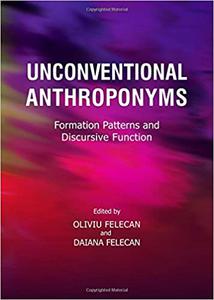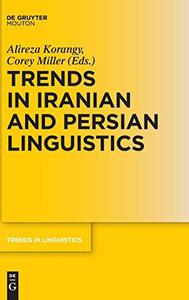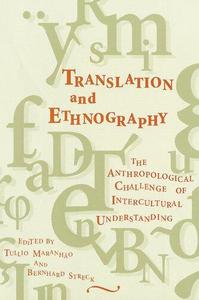 Daiana Felecan, "Unconventional Anthroponyms: Formation Patterns and Discursive Function"
Daiana Felecan, "Unconventional Anthroponyms: Formation Patterns and Discursive Function"English | ISBN: 1443860131 | 2014 | 550 pages | PDF | 4 MB
Unconventional Anthroponyms: Formation Patterns and Discursive Function continues a series of collective volumes comprising studies on onomastics, edited by Oliviu Felecan with Cambridge Scholars Publishing. Previous titles in this series include Name and Naming: Synchronic and Diachronic Perspectives (2012) and Onomastics in Contemporary Public Space (2013, co-edited with Alina Bughesiu). In contemporary naming practice, one can distinguish two verbal (linguistic) means of nominal referential identification: a "natural" one, which occurs in the process of conventional, official, canonical, standard naming and results in conventional/official/canonical/standard anthroponyms; and a "motivated" one, which occurs in the process of unconventional, unofficial, uncanonical, non-standard naming and results in unconventional/unofficial/uncanonical/non-standard anthroponyms. The significance of an official name is arbitrary, conventional, unmotivated, occasional and circumstantial, as names are not likely to carry any intrinsic meaning; names are given by third parties (parents, godparents, other relatives and so on) with the intention to individualise (to differentiate from other individuals). Any meaning with which a name might be endowed should be credited to the name giver: s/he assigns several potential interpretations to the phonetic form of choice, based on his/her aesthetic and cultural options and other kinds of tastes, which are manifested at a certain time. Unconventional anthroponyms (nicknames, bynames, user names, pseudonyms, hypocoristics, individual and group appellatives that undergo anthroponymisation) are nominal "derivatives" that result from a name giver's wish to attach a specifying/defining verbal (linguistic) tag to a certain individual. An unconventional anthroponym is a person's singular signum, which may convey a particular necessity (to avoid anthroponymic homonymy: the existence of several bearers for a particular name) or the intention to qualify a certain human type (to underline specific difference-in this case, the unconventional anthroponym has an over-individualising role-or, on the contrary, to mark an individual's belonging to a class, his/her association with other individuals with whom s/he is typologically related-see the case of generic unconventional anthroponyms).



![S.T.A.L.K.E.R. 2 / STALKER 2: Heart of Chornobyl - Ultimate Edition (2024) [+UPDATE 23.12.2024 - v1.1.3] ElAmigos / Polska wersja językowa](https://i.postimg.cc/Zqd8RWGY/UZG8PBE.jpg)



















































![David Gilmour - Luck and Strange (2024) [FLAC]](https://i.imgur.com/everaBc.jpeg)
![Męskie Granie Orkiestra - Męskie Granie 2024 (2024) [FLAC]](https://i.imgur.com/FAyOxrM.jpeg)
![The Rolling Stones - Hackney Diamonds (2023) [FLAC]](https://i.imgur.com/wCkyyUN.jpg)
![Lady Gaga - Harlequin (2024) [FLAC]](https://i.imgur.com/dcgIA8D.jpeg)
![Natalia Kukulska - Dobrostan (2024) [FLAC]](https://i.imgur.com/bdljG3O.jpeg)
![Kaśka Sochacka - Ta druga (2024) [FLAC]](https://i.imgur.com/hORQKvn.jpeg)
![Kuba Sienkiewicz - Pani Bóg (2024) [FLAC]](https://i.imgur.com/qijCx8Z.jpeg)
![Lanberry - Heca (2024) [FLAC]](https://i.imgur.com/8P7QfeR.jpeg)
![Sara James - PLAYHOUSE (2024) [FLAC]](https://i.imgur.com/m4f8OKg.jpeg)
![Grzegorz Hyży - EPILOG (2024) [FLAC]](https://i.imgur.com/8DA2sBr.jpeg)
![Myslovitz - WIECZORAMI CHŁOPCY WYCHODZĄ NA ULICE (2024) [FLAC]](https://i.imgur.com/l9mMtIG.jpeg)
![Krzysztof Zalewski - ZGŁOWY (2024) [FLAC]](https://i.imgur.com/vh48RAc.jpeg)
![Krzysztof Cugowski - Wiek to tylko liczba (2024) [FLAC]](https://i.imgur.com/SBzgqe2.jpeg)
![Nosowska - Kasia i Błażej (2024) [FLAC]](https://i.imgur.com/mObvVXQ.jpeg)
![sanah - Pianinkowe Kaprysy (2024) [FLAC]](https://i.imgur.com/pVjjPAa.jpeg)
![Kwiat Jabłoni - Pokaz slajdów (2023) [FLAC]](https://i.imgur.com/diERHfZ.jpg)
![Robert Cichy - Spacer po Warszawie (2024) [FLAC]](https://i.imgur.com/ixleU9o.jpeg)
![Viki Gabor - Terminal 3 (2024) [FLAC]](https://i.imgur.com/Q1KCnDs.jpeg)
![Sanah - Kaprysy (2024) [FLAC]](https://i.imgur.com/71OZm4h.jpeg)
![Męskie Granie Orkiestra - Męskie Granie 2023 (2023) [FLAC]](https://i.imgur.com/U4YHo8d.jpg)




